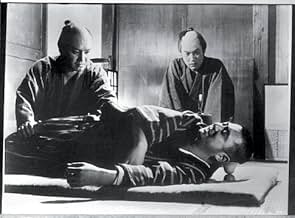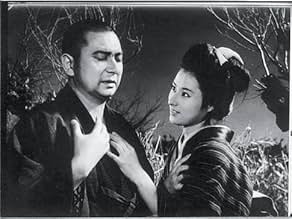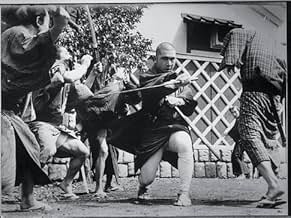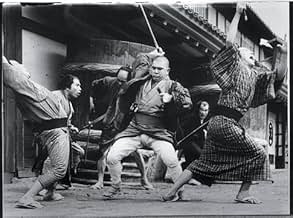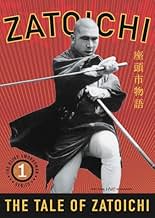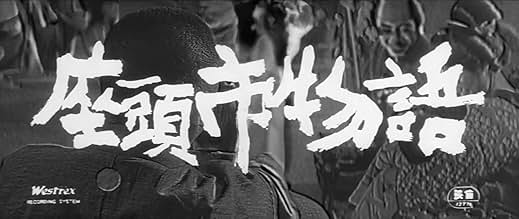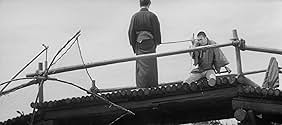Die Abenteuer eines blinden, spielsüchtigen Masseurs, der zufällig auch ein Meister des Schwertkampfes ist.Die Abenteuer eines blinden, spielsüchtigen Masseurs, der zufällig auch ein Meister des Schwertkampfes ist.Die Abenteuer eines blinden, spielsüchtigen Masseurs, der zufällig auch ein Meister des Schwertkampfes ist.
- Regie
- Drehbuch
- Hauptbesetzung
- Auszeichnungen
- 1 Nominierung insgesamt
- Masakichi
- (as Toshirô Chiba)
- Yahei
- (as Yoshito Yamaji)
Empfohlene Bewertungen
Set toward the end of the feudal Edo period (1603-1868), the film stars Shintaro Katsu as Zatoichi, an itinerant blind masseur/swordsman. He stops in the town of Iioka one day to stay with a yakuza boss, Sukegoro, who he had met on an earlier journey.
Zatoichi is humble, but has a quiet intensity. Even though he is blind, he perceives more in the situations around him than the other participants with normal eyesight. In an early scene, Sukegoro's gangsters try to take advantage of Zatoichi in a game of dice, but he uses their underestimation of him to his advantage, and hustles the gamblers out of all their money.
Zatoichi insists his impressive skills with the katana are nothing more than parlor tricks, but Boss Sukegoro hires him to stay on, as he has plans to go to war with a rival gang in nearby Sasagawa. Sasagawa boss Shigezo hires a ronin samurai, Hirate, to counterbalance Sukegoro's Zatoichi.
Zatoichi and Hirate develop a sort of friendship, but their affection toward each other has less to do with their love of fishing or drinking than on their common code of honor. Even though they know they will be expected to fight to the death in the war between Iioka and Sasagawa, this doesn't stand between their personal friendship.
So it follows that the most interesting conflict in the movie is not the yakuza warfare between the Iioka and Sasagawa gangs, but the conflict between Zatoichi and Hirate. Hirate is dying of consumption, and seems to prefer death by Zatoichi's sword rather than let his illness or an unworthy gangster take his life.
"The Tale of Zatoichi" is both fun and stylish. But rather than being a by-the-numbers action flick, the filmmakers took the time to develop characters the audience can actually care about, which elevates Zatoichi above other films of this genre.
The story of a blind, meek master swordsman "Zatoichi" is very well done, just a notch below Seven Samurai in excellence. The lead actor who plays "Ichi" in almost all the films, Shintaro Katsu, later wrote and directed some entries.
The plots are interesting and characters well-drawn. Anyone who enjoyed the Samurai films of Akira Kurosawa with Toshiro Mifune should enjoy this film and its sequels. "Ichi" is similar to the Mifune characters in his deliberately unprepossessing appearance and aversion to violence, but when he is pushed too far, watch out! Also, despite his blindness and poverty, he is something of a chick-magnet for some very attractive Japanese women.
You can find considerably more detail on Shintaro Katsu and these films on Wikipedia.
Others have described this movie well, so, I will only add something that I noticed while watching the scene of Ichi fishing with the ailing samurai. What made the scene so compelling was not what was said, but, the effective use of silence between them. The pauses in dialog were masterful, especially the long lull at the end of the sequence. It reminded me of some of Kurosawa's work.
I recommend this movie, not as the first Zatoichi that you see; but, rather as something to experience after a few of the more exciting movies...after you've developed a relationship with the character.
The reasons why the Zatôichi franchise enjoys such an enormous cult-status are numerous, but I will stick to the most important ones. The eponymous hero, Zatôichi must be the most likable character ever in cinema to work as a hired sword. Zatôichi, a blind masseur, has obtained his sword skills because he was tired of being looked down upon by others, as usual for blind people in Feudal Japan. Due to his excellent sword-skills, he makes a good living as a hired swordsman. His senses of smell and hearing are as excellent as his swordsmanship, which makes him one of the most powerful swordsmen. Even so, Zatôichi is a kind, gentle and humorous man by nature, who will rather solve problems otherwise than having to kill someone. Shintaro Katsu is brilliant in the role of his life, and I cannot imagine for anyone else to fit the role like Katsu did. Cult-filmmaker Takeshi Kitano (of whom I am a great fan) took a new turn on the role in 2003 - Katsu had passed away in 1997 - and did so greatly. Yet, to me, the only true Zatoichi will always be Shintaro Katsu. This first film in the series is one of only two that were filmed in black and white, and it already epitomizes what makes the brilliance of the series. "Zatôichi Monogatari" mixes Smurai Action with Comedy, Drama and philosophical elements. The film begins with the crafty Zatôichi, who tricks a bunch of fellow gamblers into underestimating him... The film marks the beginning to a great and highly successful series that may not be missed by any lover of Japanese cinema. I had seen several other "Zatôichi" films with Katsu, as well as the 2003 film with (and by) Kitano before seeing this one. The action is great in this first film, but it is the plot that outweighs the fighting by far. Overall, "Zatôichi Monogatari" is a fantastic piece of cult-cinema and everybody even remotely interested in Japanese films must see it.
In this first episode of a series that covered two decades, Ichi is hired by a gang leader to defeat a consumptive samurai who's been imported by a rival gang. The two swordsmen meet while fishing and become friends, but destiny has decreed they must fight each other, and only one will survive
Fans of action movies may be disappointed with ZATOICHI MONOGATARI, because there's virtually no fighting for the movie's first hour. Instead, there's unusual emphasis on character development. Ichi himself receives much of the attention, and Shintaro Katsu (who also played the role in all the sequels) presents us with a subtle, complex portrayal of the reluctant mercenary. His scenes with the enamored sister of one of the gang members and with the mortally sick samurai are played with great sincerity without becoming sentimental. These two characters are also sensitively portrayed. Even many of the crooks are carefully established as individuals.
The climax won't disappoint action fans, though. Beginning with a flurry of gang skirmishes, frenetically edited to a throbbing score, it ends on a bitter and almost tragic note after the inevitable confrontation between the two protagonists.
Director Kenji Misumi embellishes the slow build-up with a succession of captivating black-and-white compositions and attention to period detail. A degree of pace is maintained by making scene transitions with cuts rather than dissolves. Sets are given visual depth by being framed with foreground objects. The camera is often positioned slightly above or below the characters' eye-lines. Very precise interior lighting creates interesting patterns on and around the actors. By contrast, the daytime exteriors are overly bright and tend to disrupt the mood.
Far from being a typical samurai movie, ZATOICHI MONOGATARI is an unusually somber yet effective period drama, and probably the best entry in the long series it inaugurated.
Wusstest du schon
- WissenswertesHanji's wife Yoshi practices "ohaguro" (literally: "black teeth"). In many areas of Asia, blackened teeth were considered a sign of beauty and maturity. In Japan, the practice was banned by the government in 1870.
- PatzerIn the moonlit scene by the pond, Tane tells Zatoichi that she has a facial mole exactly like his. But neither character has any such mole.
- Zitate
Tane: You have a mole here. I wonder if it's a lucky mole. I have one just like it. They say it means I'll have lots of children.
Zatôichi: It's a lucky mole.
Tane: What would I do with so many children.
Zatôichi: Just don't raise them to be yakuza.
Tane: I won't. But why do you say that?
Zatôichi: Because to be a yakuza is a foolish way to live.
Tane: Then why don't you live a decent life?
Zatôichi: It's like being stuck in a bog. It's not easy to pull yourself out once you've fallen in.
- VerbindungenFeatured in Best in Action: 1961 (2018)
Top-Auswahl
Details
- Erscheinungsdatum
- Herkunftsland
- Sprache
- Auch bekannt als
- The Tale of Zatoichi
- Produktionsfirma
- Weitere beteiligte Unternehmen bei IMDbPro anzeigen
- Laufzeit1 Stunde 36 Minuten
- Farbe
- Sound-Mix
- Seitenverhältnis
- 2.35 : 1

